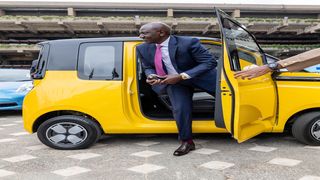
President William Ruto arrives for opening of the inaugural Africa Climate Summit in an electric clean energy-powered car at Kenyatta International Convention Centre, Nairobi, on Monday September 4, 2023.
| PCSOur Columnists
Premium
Electric cars can’t run on blackouts!
Kenya was plunged into darkness recently. The country went pitch-black. Jomo Kenyatta International Airport, one of the most important transport hubs in Africa, was forced to cancel flights due to a national blackout. The first time JKIA may have experienced such an embarrassing incident in its history perhaps.
The ministers in charge of Transport and Energy , unsurprisingly, thought the head of the Kenya Airports Authority was the only one to blame for the total blackout and made him a sacrificial lamb by sacking him, when in fact, the two ministers should have been the ones to resign for the mess and the global shame on the country caused by the blackout.
There is always something or someone to blame for electricity blackout. The last national blackout was blamed on the innocent monkey. How one monkey could trip up the national grid boggles the mind. One would think that monkeys and other power-cutting animals are foreseen by engineers and strive to keep them off power grids.
This time around, it was a junior official who took the blame. The government would rather apportion blame on junior officials or the monkey than deal with the monkey business going on within the electricity department that has allowed a few individuals to hold the rest of the country to ransom.
Kenya Power has been the citadel of corruption for some time now. It graduated from its officials asking for bribes to connect paying customers to the grid, to big buck electric pylon scam, to now token nightmares experienced by customers. I used to think the walls ate my tokens as they went faster than I could switch the lights on!
Electricity, water and now the internet are drivers of a country’s economy. They sift the developing countries from the developed ones. It is the dividing line between major economies and Africa which continues to reel from poorly managed power companies. Nigeria, one of the largest oil producers in the world, can barely keep its power company running. South Africa, despite inheriting a well-oiled power company, chose to sit in the dark and let corruption gut the innards out of Eskom. Both Nigeria and South Africa have normalised blackouts and Kenya perhaps thinks they are the examples to follow rather than build affordable, sustainable and reliable national electricity company. Corruption in Africa is like a flu that spreads across the continent like nothing else does.
Talking of flu, Kenya is considered the economic powerhouse of East Africa. Apparently when it sneezes, the rest of East Africa catches a cold. Sometimes I wonder whether that accolade is factual given the ineffective way with which key government departments are run, with Kenya Power being a good example of rot in government, closely followed by the sugar industry that attracted cartels to it like bees to honey. One wonders sometimes how big a stride the country could achieve periodically if it had uninterrupted supply of electricity and water — two key factors that fuel industries needed to spur the economy. The negative impact constant interruption of electricity has on the economy cannot be over-emphasized. Every hour a business is shut due to electricity blackout is money wasted and does not instil stability in businesses.
Kenya cannot keep lights on in homes but now wants to go electric on cars! This is akin to putting the cart before the horse. Firstly, we lack uninterrupted electricity supply given our history of national blackouts. Secondly, electric cars need charging points across cities for the scheme to succeed. Electric charging points, lest we didn’t know, need electricity. Where will that come from if we don’t even have enough power to keep our homes lit? No other city in Africa, if not the world, needs electric cars than Nairobi given its polluted air. Areas in the central business district and near Eastlands is notorious for poor air quality which has been attributed to smoke from diesel-run cars and poorly maintained vehicles. Huge numbers of matatus take fare share of the blame. Pollution in Nairobi is ‘beyond imagination and has sparked health warning’ according to an article in UK’s Guardian newspaper in 2016. “The amount of cancer-causing elements in the air within the city is 10 times higher than the threshold recommended by the World Health Organization,” according to Marie Thynell, Urban researcher from Sweden’s Gothenburg University.
Introduction of electric vehicles in Kenya now is being unrealistic if not pretentious. Without improving management of power companies in Kenya and end corruption within Kenya Power for instance, we won’t achieve the transition from vehicles run on fossil fuel to those run on clean energy such as electricity. There is a lot that Kenya needs to consider before the switch. The idea of bringing in electric vehicles without the presence of charging points reeks of corruption already. The country needs to lay the groundwork for the transition by first working on its electricity supply. Electric cars don’t run on blackouts. They need uninterrupted supply of power and zero corruption.
Ms Guyo is a legal researcher, [email protected]. @kdiguyo





